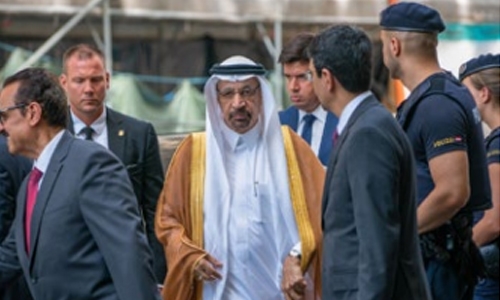Oil jumps on Saudi, Russia output deal
Oil prices jumped yesterday as OPEC nations moved towards extending daily oil output caps that help the price of crude rise strongly this year. Ministers from the 14-nation Organization of the Petroleum Exporting Countries (OPEC) were meeting in Vienna yesterday to discuss output, before gathering a day later for OPEC+ -- which is a grouping of 24 oil-producing countries that includes Russia and accounts for almost half of global crude.
“Everyone supported the proposition to extend for nine months the limits agreed in December,” Novak said after a gathering of oil ministers and before the cartel’s main meeting later Monday. OPEC and its oil-producer allies had decided in December to trim daily crude output by 1.2 million barrels after prices tanked at the end of last year on fears of slower global growth. This helped crude prices jump by a third in the first quarter of the year, boosting revenue for oil producing nations, but the deal ran only through to the end of June.
Russian President Vladimir Putin and Saudi Arabia grabbed the headlines on Saturday with an agreement to extend the deal, which has helped soak up extra supplies on the market. Putin announced that the pair agreed on the sidelines of the G20 in Osaka on an extension of between six and nine months. The news sent New York oil prices shooting above $60 per barrel on Monday for the first time since May, with sentiment also buoyed by rising global equities after Washington and Beijing agreed to restart trade talks.
In afternoon deals, West Texas Intermediate crude for August delivery stood at $60.17, up 2.9 percent in value. However, the Russian-Saudi deal news sparked consternation among some major oil players, despite the fact that there is widespread support for an extension. Nigeria’s delegation chief meanwhile played down talk that Riyadh and Moscow were “ganging together” in a deal that could potentially herald the death of OPEC. “I wouldn’t agree that OPEC is dying,” said Dr Folasade Yemi-Esan, Permanent Secretary at Nigeria’s Ministry of Petroleum Resources.
“If 24 countries are committed to working together, if those countries are still committed to this cooperation, I don’t see how death is coming.” United Arab Emirates Energy Minister Suhail al-Mazrouei also voiced his support for an extension -- but stressed that any nation could still veto the Osaka agreement.
“Each country’s voice counts and each country can veto a decision,” Mazrouei stated. Saudi Arabia’s energy minister Khalid al-Falih, arriving in Vienna early on Sunday, declared that he wanted the cutbacks which began in January to be extended by nine more months to March 2020.
Related Posts

